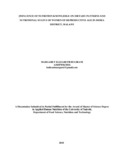| dc.description.abstract | Nutrition knowledge plays a key role in choosing diets and contributes to the improvement of dietary habits which in turn, result in improved nutrition status of women of reproductive age (WRA). However, an association between nutrition knowledge, dietary patterns and nutrition status of WRA of Malawi has not been clarified. This study was therefore conducted to assess the association of nutrition knowledge, dietary patterns and nutrition status in order to provide information to policy makers to develop evidence based policies or programmes and add to the limited data. Analytical cross section study designs involving 302 WRA was conducted in Dedza district of Malawi from August to September 2017. A pretested questionnaire was used to collect data. Individual Dietary Diversity score (IDDs) and 24-hour dietary recall are tools that were used to determine dietary patterns. Nutrition status was assessed using Body Mass Index (BMI). Data was analyzed using SPSS and nutrisurvey software. Results showed that older women (33-49 years) were more knowledgeable than young women (15-32 years). WRA from Traditional Authority Chauma had greater nutritional knowledge compared to other TAs. Starchy staples and leafy vegetables was the most identified dietary intake practiced by WRA, with only 15% who consumed fruits. Mean IDDs was 4.4 ± 1.7, while 56.8% of women consumed below the recommended five food groups per day. The diets were inadequate in calcium, vitamin A and deficient in vitamin B12. Nutrition knowledge was significantly associated with dietary patterns with regards to consumption of fruits, eggs and IDDs. The results have also shown that 3%, 19.9% and 6% were underweight, overweight and obese respectively using BM1 cut-off points. Underweight and obesity were more frequent in older women (33 to 49 years) while overweight was common in younger women (15 to 32 years). WRA from all Traditional Authorities were vulnerable to overweight. Bivariate correlation and logistic regression results showed that morbidity status, wealth index, level of knowledge and assets ownership were significant risk factors associated with nutrition status of the study population. In conclusion, the diets of the WRA in Dedza district are inadequate, poor in quality and do not meet the recommended dietary diversity score. They are influenced by nutrition knowledge with regards to consumption of eggs and fruits. There is undernutrition and overnutrition among WRA in Dedza district, however the prevalence of the latter is higher than the former. Morbidity status, wealth index, level of knowledge and assets ownership are risk factors for nutrition status of WRA in Dedza district. Hence, there is need to promote nutrition education especially on dietary practices, besides empowering women economically. The identified risk factors must be taken into consideration by policy makers when planning, designing, prioritization, targeting and managing of nutrition interventions. | en_US |

